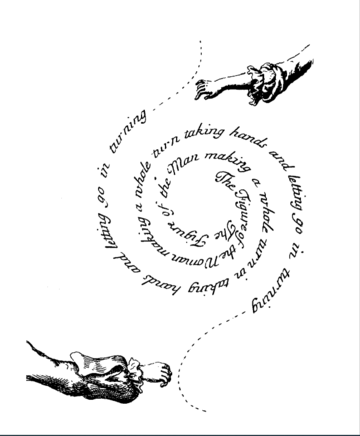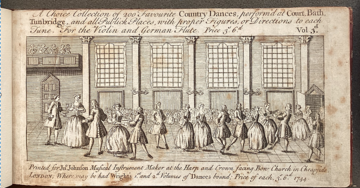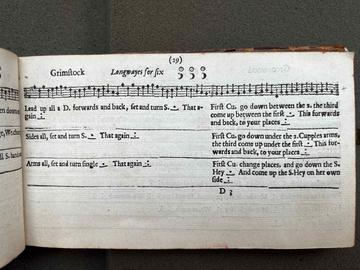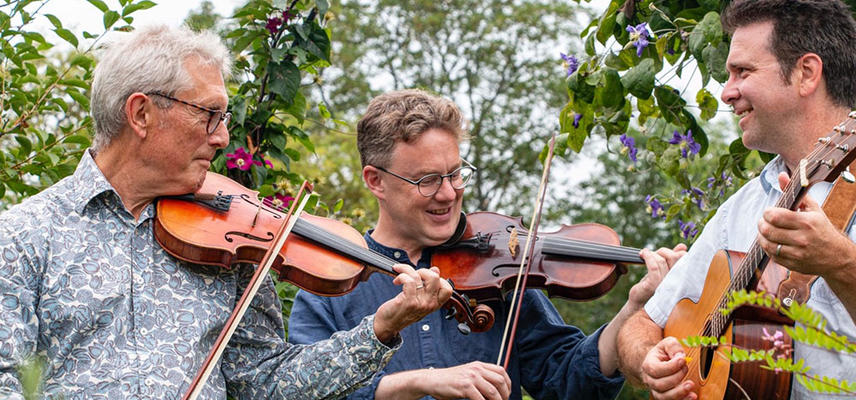The Dancing Master

The Dancing Master
Playford’s Dancing Master was the first published collection of English country dances and their tunes, starting in 1651 and spanning 18 editions over 80 years. It spawned numerous imitations throughout the 18th century. This year is the 400th anniversary of the birth of John Playford.
The music and dances continue to be loved by millions across the world, not least due to their inclusion in film and television, such as Bridgerton, Pride and Prejudice and Poldark.
This exhibition celebrates not only English country dancing but also the role of the Dancing Master during the 17th and 18th centuries, who would teach steps and choreograph new dances for court and assemblies.
A programme of events to accompany the exhibition includes concerts, workshops for musicians and dancers, and a Playford Ball.
Events
The Dancing Master: Playford Dancing for Beginners
The Dancing Master: Switched-on Playford
The Dancing Master: The Playford Ball
People
People
Dr Alice Little
Alice is a Research Fellow at the Bate Collection of Musical Instruments, part of the Music Faculty at the University of Oxford. Her research focuses on collectors and collecting, particularly eighteenth-century tunebooks and their compilers, looking at what sources the collections were gathered from and what the selection of music says about the people and cultures that collected and used them. She completed two TORCH Knowledge Exchange Fellowships (2019-2021) working with the English Folk Dance and Song Society on the eighteenth-century tunebooks in their collection. alice.little@music.ox.ac.uk
Matthew Coatsworth
Matthew is a significant figure in the world of 17th and 18th century English country dance music. He has performed with groups including Boldwood, The Warleggan Village Band and on screen for BBC’s Poldark and Netflix’s Bridgerton. His research has led to four Boldwood Dancing Master publications. In addition to his musical activities, Matthew is a senior leader at Oxfordshire Teacher Training working with nearly 100 primary, secondary and special schools across the region; he has extensive experience working on musical projects with schools, including Folk Weekend Oxford, Oxfordshire County Music Service, Oxford Lieder Festival and Oxford Opera. mail@warlegganvillageband.uk
Dancing master history
A dancing master was both a person who taught dance (particularly to the children of the gentry) and a type of book from which one could learn dances and the tunes used to accompany them. John Playford's The English Dancing Master (1651) was the first such collection to be published. It contained the melodies and dance instructions for just over 100 English country dances, with the music and dance instructions printed side by side. Retitled simply The Dancing Master by 1652 and for the remaining 17 editions, these books were published by John and then his son Henry Playford, and spawned numerous imitations throughout the 17th and 18th centuries. Our exhibition includes several editions of The Dancing Master from the Bodleian collection.
Playford almost certainly did not write any of the melodies or dances. Some tunes were very old: for example, Mundesse, a round dance, is almost identical to Mon Desir from Susato’s Danserye of 1551. Similarly, Halfe Hannikin was one of the country dances in the masque Time Vindicated performed by the future Charles I, amongst others, on 19 January 1623.
Wood 125 Playford, J. (1652) The Dancing Master, 2nd edition (Bodleian Libaries)
Dance titles often referred to popular ballads, including some that were celebrated cavalier songs that Cromwell’s Parliament tried to suppress. For example, Faine I would if I could, was a ballad also known as ‘The King’s Complaint’ and ‘A Coffin for King Charles’. It was an elaborate dance performed whilst the Royal court was at Oxford.
Playford’s Dancing Master books were incredibly popular. Playford’s introduction to his Dancing Master, entitled ‘To the Ingenious Reader’, refers to dancing in the ‘Courts of Princes’ and by ‘The Gentlemen of the Innes of Court’. It is therefore likely that Playford’s customers would have been educated people. One was Samuel Pepys: in his celebrated diary he wrote, ‘By water down to Greenwich and then walked to Woolwich, all the way reading Playford’s Introduction to Musique wherein are some things very pretty.’
You can find out more about the history of dancing masters by visiting the exhibition (September 2023–January 2024), attending the in-person lecture (24th October), or watching one of our online talks (2nd November, 28th November). See Events tab to register.
Exhibition
The project will showcase Playford’s Dancing Master and associated work by exhibiting original publications held in the Bodleian Library in the Weston Library’s temporary exhibition space in the Blackwell Hall from September 2023 to January 2024. The exhibition is free. Items on display will include:
Dancing Master books, including those of the second edition of Playford’s The Dancing Master, published 1652 (Wood 125), and John Johnson’s A Choice Collection of 200 Favourite Country Dances, Volume 3, 1744 (Douce DD101)

Dances with a connection to television and film, for example, Grimstock, featured in BBC television adaptation of Pride and Prejudice
Playford Dancing Master 5th edition, 1675 (Harding F328)

Items connecting John Playford and Samuel Pepys. On 22 March 1667, Pepys recorded in his diary that he, ‘by water down to Greenwich and thence walked to Woolwich, all the way reading Playford’s “Introduction to Musique” wherein are some things very pretty.’ The Bodleian’s copy of this book (Vet. A3 f.1925) will be on display.
Pepys was a fan of catches (songs sung as rounds) and wrote on 23 November 1666, ‘At the Temple I called at Playford’s, and there find that his new impression of his ketches are not yet out, the fire having hindered it, but his man tells me that is will be a very fine piece, many things new being added to it.’ On 15 April 1667, Pepys purchased, ‘Playford’s new Catch-book that hath a great many fooleries in it’. The Bodleian’s copy of Playford’s Catch that Catch Can (published 1652) will be on display (Wood 126).
Dancing Masters (the people). In addition to material published by John and Henry Playford, the exhibition will include publications that focus on the role of the Dancing Master as choreographer and tutor. The Union, A New Dance compos’d by Mr Isaac (Don. d.45) with Feuillet’s dance notation, and Rameau’s The Dancing Master, or The Art of Dancing Explained (Vet. A4 d.86) translated by John Essex, are two examples on display.
Speaker bios
Alongside the exhibition at the Bodleian and our public engagement workshops, concerts, and the Playford Ball, we are organising three public talks to share the history of these materials. See the Events tab for booking information.
Jeremy Barlow: A dance band for Playford? – Online talk, Thursday 2nd November
Jeremy Barlow specialises in English popular and dance music from 1550 to 1750, and also has a particular interest in the illustration of music and social dance over the centuries. He has lectured on a variety of subjects for organisations such as the The Arts Society, U3A, the Art Fund and National Trust. He is President of the Dolmetsch Foundation. His books include The Enraged Musician: Hogarth’s Musical Imagery (Ashgate) and The Cat & the Fiddle: Images of Musical Humour from the Middle Ages to Modern Times (Bodleian Library). The Bodleian Library has also published A Dance Through Time: Images of Western Social Dancing from the Middle Ages to Modern Times. Jeremy is well known for his work on Playford and has published an edition of Playford's dance tunes, The Complete Country Dance Tunes from Playford’s Dancing Master (1651-ca.1728) (Faber Music).
Rebecca Herissone: The Dancing Master in context – online talk, Tuesday 28th November
Rebecca Herissone is Professor of Musicology at the University of Manchester and a Fellow of the British Academy. Her research focuses on the musical cultures of early modern England, particularly issues of creativity, reception and manuscript and print cultures, which has led her to work extensively on the publishing activities of John and Henry Playford, Thomas Cross and John Walsh, and to consider the complex relationships between musical notation and performance in the period. She has written three monographs, most recently Musical Creativity in Restoration England (awarded the Diana McVeagh Prize by NABMSA in 2015), and has had articles published in journals including the Journal of the American Musicological Society, Musical Quarterly, Journal of Musicology, Music & Letters, and the Journal of the Royal Musical Association. She co-edited Music & Letters from 2007–19 and is now a Vice-President of the Royal Musical Association, Chair of the Musica Britannica Editorial Committee, Series Co-Editor of Cambridge Elements in Music, 1600–1750, a General Editor of the Works of John Eccles, and a member of the Editorial Boards of the Purcell Society and Music & Letters. Her current research focuses on Purcell’s reception, particularly the material traces we can uncover of the small network of individuals who preserved, performed and transformed his music in the 18th and 19th centuries.
Alice Little: Alice Little: chair/interlocutor for the online lectures on 2nd November and 28th November.
Alice Little is a Research Fellow at the Bate Collection of Musical Instruments, part of the Music Faculty at the University of Oxford. Her research focuses on collectors and collecting, particularly eighteenth-century tunebooks and their compilers, looking at what sources the collections were gathered from and what the selection of music says about the people and cultures that collected and used them. Her DPhil focused on the tunebooks of JB Malchair, who collected ‘national music’ in Oxford, and whose handwriting can be seen in the 1652 edition of Playford’s Dancing Master on display as part of this project. She completed two TORCH Knowledge Exchange Fellowships (2019-2021) working with the English Folk Dance and Song Society on the eighteenth-century tunebooks in their collection.
Musician bios
To bring this music and dance to new audiences for 2023-24 this project incorporates a range of concerts and workshops, all suitable for beginners and free of charge. See Events tab for booking information.
Leveret concert on Sunday 15 October 2023
Leveret is a unique collaboration between three of England's finest folk musicians. Andy Cutting, Sam Sweeney and Rob Harbron are each regarded as exceptional performers and masters of their instruments. Together their performances combine consummate musicianship, compelling delivery and captivating spontaneity. Leveret’s music is not arranged in the conventional sense and instead they rely on mutual trust, listening and responding. Their playing is relaxed and natural, drawing audiences in and inviting them to share in music making that is truly spontaneous and yet deeply timeless.
Fiddler Sam Sweeney was the 2015 BBC Folk Awards Musician of the Year, a veteran of the mighty Bellowhead, and inaugural artistic director of the National Youth Folk Ensemble. Melodeon genius Andy Cutting, a three-time BBC Folk Awards Best Musician, is a compelling solo performer and currently works with Blowzabella, Topette, June Tabor, and Roger Daltry. Concertina wizard Rob Harbron leads the English Acoustic Collective summer school and is known for his work with The Full English (Best Group and Best Album BBC Folk Awards 2014), Emma Reid, Fay Hield, Jon Boden and others.
The Oakstone Trio concert on Sunday 5 November
‘Lifting tunes off the page’ workshop on Sunday 3 December
After years of playing together on the Oxford session scene and in folk clubs, The Oakstone Trio came together in early 2022 for Folk Weekend: Oxford.
Louis Thurman (melodeons, vocals), Mitch Keely (guitar, vocals), and Joshua Newman (fiddle, viola, vocals) combine a nuanced, improvisatory approach to tunes with energy and warmth, allowing seldom-heard tunes to escape old manuscripts and giving well-loved session tunes the space to find new directions. They pair new compositions with old tunes and solo ballads with harmony chorus songs.
Chris Green’s Switched-on Playford concert on Sunday 19 November
Chris Green’s Switched-on Playford was inspired by Wendy Carlos’ seminal 1968 recording Switched-on Bach. It reimagines and revoices 17th and 18th century English country dances using a blend of electronic, modern and early instruments to create music that is vibrant and new but also deeply rooted in and respectful of its source.
Chris Green is a musician and composer. He is one half of modern-day balladeers GreenMatthews and a regular musician for Shakespeare’s Globe. He also plays with the Warleggan Village Band, who will be performing for The Dancing Master’s Playford Ball in January 2024.
The Warleggan Village Band and Andrew Swaine Playford Ball on Saturday 13 January 2024
Richard Heacock (violin), Matthew Coatsworth (violin and concertina) and Chris Green (guitar) formed The Warleggan Village Band to play for dance sequences in BBC TV’s Poldark, and later in the hugely successful Netflix series Bridgerton. The band is renowned for its exceptionally inventive playing of English country dance music from Playford to Regency times, bringing joy and energy to dancers and listeners alike.
As well as performing for The Dancing Master’s Playford Ball, The Warleggan Village Band have provided audio examples of music displayed in the exhibition.
Andrew Swaine is one of the most respected callers in the country, whether for ceilidh, American contra or Playford. His research into early Playford dances made him an obvious choice to lead dancers at our Playford Ball. Andrew runs Playford in the Pub, a monthly music and dance session held in The Shakespeare pub in Sheffield.
Beginner Playford Dance Workshops
Sunday 5 November
Thursday 30 November
Wednesday 6 December
These workshops are designed for those with no experience of Playford dances.
Steph West will be teaching our dance workshops. She is a musician, educator and caller, best known as a harpist and for her ability to build confidence and enjoyment for beginners. Steph’s current projects include an electroharp, drums and voice duo with Paul Rademeyer, the English Harp Project with Matthew Coatsworth and accordionist Tom Evans, and work with RNS Moves as a performer and composer.
Giles Lewin specialises in medieval music and the traditional music of Europe and the Middle East. He has played with The Carnival Band, June Tabor, Maddy Prior, Bellowhead and the Dufay Collective amongst many others. His album Time’s Chariot focused on music from Playford’s Dancing Master.
Matthew Coatsworth is curating The Dancing Master exhibition at the Bodleian Libraries. A former member of Boldwood, he plays with The Warleggan Village Band, First Folio and with Steph West’s English Harp Project.
Events
From September 2023 to January 2024 we will be running a series of concerts, workshops and talks, in person and online. All events and other content will be accessible to all, and free of charge.
Sunday 15 October 2-3pm at the Blackwell Hall, Weston Library
Leveret concert
fully booked (waiting list https://visit.bodleian.ox.ac.uk/event/oct23/leveret)
Thursday 2 November 5.30-6.30pm online
Online talk with Jeremy Barlow and Dr Alice Little – A dance band for Playford?
https://visit.bodleian.ox.ac.uk/event/nov23/a-dance-band-for-playford
Sunday 5 November 12-1pm at the Blackwell Hall, Weston Library
Playford dancing for beginners with Steph West, Giles Lewin and Matthew Coatsworth
fully booked (waiting list https://www.eventbrite.co.uk/e/playford-dancing-for-beginners-tickets-679248539667)
Sunday 5 November 2-3pm at the Blackwell Hall, Weston Library
Oakstone Trio concert
fully booked (waiting list https://visit.bodleian.ox.ac.uk/event/nov23/the-oakstone-trio)
Sunday 19 November 2-3pm at the Blackwell Hall, Weston Library
Chris Green’s Switched on Playford concert
https://visit.bodleian.ox.ac.uk/event/nov23/switched-on-playford
Tuesday 28 November 5.30-6.30pm online
Online talk with Professor Rebecca Herissone and Dr Alice Little – The Dancing Master in context
https://visit.bodleian.ox.ac.uk/event/nov23/the-dancing-master-in-context
Thursday 30 November 7-8pm at The Cherwell School
Playford dancing for beginners with Steph West, Giles Lewin and Matthew Coatsworth
https://visit.bodleian.ox.ac.uk/event/nov23/playford-dancing-for-beginners
Sunday 3 December 12.30-2.30pm at the Blackwell Hall, Weston Library
Lifting tunes off the page workshop with The Oakstone Trio
https://visit.bodleian.ox.ac.uk/event/dec23/lifting-tunes-off-the-page
Sunday 3 December 2.30-3.30pm at the Blackwell Hall, Weston Library
Playing Playford tune session with Matthew Coatsworth
https://visit.bodleian.ox.ac.uk/event/dec23/playing-playford
Wednesday 6 December 7-8pm at The Cherwell School
Playford dancing for beginners with Steph West, Giles Lewin and Matthew Coatsworth
https://visit.bodleian.ox.ac.uk/event/nov23/playford-dancing-for-beginners
Saturday 13 January 2024 at the Blackwell Hall, Weston Library
Playford Ball with Andrew Swaine and The Warleggan Village Band
(booking opening in autumn https://visit.bodleian.ox.ac.uk/event/jan24/the-playford-ball)
Social Media
Connect with project organisers and others, and see videos and other content at:






